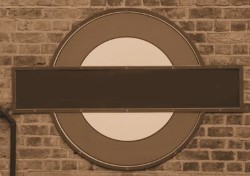
 |
“This station was never finished, and the Government picked it up. It was perfect for this little operation,” said Cavendish jovially. The death of Perkins, Roberts and nine others didn’t seem to have affected him at all.
At the far end of the platform ws a very large heavy steel door, guarded by two alert-looking soldiers. Cavendish and Horton were evidently known and treated with deference, and led the investigators into a complex of rather splendid hallways, lit with the new Electric lights and panelled in oak.
Each investigator was shown to a small but comfortable room. Nearby were other bedrooms, a dining room, a day-room with various diversions, and a library with a table big enough for conferences. Books in the library include works on various technical subjects, astronomy, biology and a small section on the Occult, tucked away behind a courtesy grille.
The investigators, battered and tired, none the less gathered around Cavendish and demanded the postponed explanation of what had happened in the Cylinder. The knight agreed without much resistance, and soon everyone was settled in comfortable chairs in the Library, served drinks and other refreshments by unobtrusive servants as Cavendish stood before the fireplace and prepared to answer their questions. The first was obvious; but the apparent openness of the answer was surprising.
"Yes, I took the crystal egg. It's one of the few things we saw today that I recognized immediately, and it's not something we want to fall into the hands of just anyone. It may very well be the key to victory."
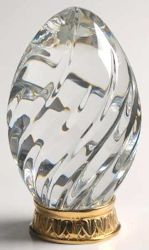 |
Quartermain stirred. "What does it do, then, to make it that important?" Cavendish smiled, almost boyish with enthusiasm. He plucked the egg from his pocket, and set it on the table, where it glittered malevolently in the firelight. "See for yourself," he said, "pick it up. Before you ask, I won't tell you what to expect. Better no preconceptions." Slowly Quartermain reached out and picked it up.
A gusty wind whirled orange dust across the reddish, rocky landscape, stirring the red and brown plants that carpeted the ground around the buildings. Three Martians passed by. Whereas on Earth every movement for a Martian was an agonized, convulsive struggle, here they moved lightly, swiftly, their bodies raised from the ground on their tentacles. A horse might outrun one, but not a man.
In the distance the tall, angular shapes of machines like the Fighting Machine could be seen,striding along or bent over to work on something on the ground.Smaller, squatter machines beetled around in the middle distance.
Suddenly, shockingly close, a Martian came into view, as it seemed staring directly into the eyes of the observer. Vast, dark, liquid eyes gazed into Quartermain's, apparently coolly and dispassionatly considering how he should be disposed of...
With a jolt, Quartermain came back to himself as the Egg dropped gently back to the table. Eyes wide, he backed slightly away, shaken by the unspeakable intelligence and cold inhumanity in the creature's gaze. His friends started up, concerned as he sat heavily in his chair, shaking. Hesitantly, he recounted what he'd seen. There was a pause, and then Churchill gritted his teeth and picked up the Egg.
Similar scenes appeared in his vision, though less clearly, and he frowned at the sight of the Martians' speed in their natural environment. They'll be hard to fight if we ever take the battle to them, he thought. Then he shook his head. His mind was playing tricks on him, he thought, making him think he could hear whispers of unintelligible words in his head. Putting the Egg down, he glanced at Holmes. He didn't mention the whispers.
After a moment's thought, the detective picked up the glittering thing, turning it in his fingers to see if this affected the visions. It didn't, so he turned his enormous intellect to thoughts of seeing something different, something to the left of where he was currently looking. There was a moment's pause, and then the scene turned, as if the viewer were rotating his head, and a different part of the Martian landscape became apparent. The effort required was much, and strange, a form of exertion utterly unfamiliar. He found himself looking at a huge cylindrical well in the ground, more than thirty yards across, and with a scorched area around it. Nearby rested several cylinders like the one at Horsell Common. It came to him that he was looking at the vast Gun from which the invasion had been launched. Engaged, he strove to move the viewpoint still more, but suddenly the vision scattered and he leaned forward, feeling enormously tired.
 |
- It is commonly supposed that they communicated by sounds and tentacular gesticulations; this is asserted, for instance, in the able but hastily compiled pamphlet (written evidently by someone not an eye-witness of Martian actions) to which I have already alluded, and which, so far, has been the chief source of information concerning them. Now no surviving human being saw so much of the Martians in action as I did. I take no credit to myself for an accident, but the fact is so. And I assert that I watched them closely time after time, and that I have seen four, five, and (once) six of them sluggishly performing the most elaborately complicated operations together without either sound or gesture. Their peculiar hooting invariably preceded feeding; it had no modulation, and was, I believe, in no sense a signal, but merely the expiration of air preparatory to the suctional operation. I have a certain claim to at least an elementary knowledge of psychology, and in this matter I am convinced--as firmly as I am convinced of anything--that the Martians interchanged thoughts without any physical intermediation. And I have been convinced of this in spite of strong preconceptions. Before the Martian invasion, as an occasional reader here or there may remember, I had written with some little vehemence against the telepathic theory. - From the memoirs of John Smith, Journalist. |
"You see?" said Cavendish. "If they attack us again, we will see it coming. We will have the warning we need to prepare and that may make all the difference." Churchill leaned earnestly forward. "Can they see us?" he asked urgently. Cavendish looked uncertain. "We are not sure," he said. "Sometimes, it seems as if they might be able to, but we have never been able to be certain." Horton, sitting well back, shivered, and Holmes noticed it, though he said nothing. Churchill's voice rose slightly. "Don't you feel, sir, that this may be something of a risk?" Cavendish made a gesture of concession. "Perhaps," he said, "but you'll notice that I brought this one here in my pocket," he tapped his jacket, "so if so, any observers won't know where we are. And in any event, I can't see them understanding anything they do see." Quartermain spoke from his chair, his voice still rough with shock: "Bastard looked at me."
The group discussed each observer's experiences. Cavendish revealed that most people saw slightly different things through the Egg, usually variations on today's viewings. An argument broke out between Smith and Cavendish over the concept of Martian Telepathy. Smith was convinced that the Martians could communicate mind-to-mind, whereas Cavendish was adamantly against any such notion. "We should stick to reality, I think, not fairy stories" he said dismissively. "Oh, fairy stories - such as Men from Mars coming down from the sky?" said Holmes archly. Cavendish glared at him and changed the subject.
 |
Holmes thought of something. "You said other people had experienced this," he said, "I presume this means you have more than one of these?" Cavendish nodded. "Yes, one more, though damaged and not found in situ like this one." Holmes nodded. "Have you considered the possibility of communication between these crystals?" he asked. Cavendish nodded again, face alight with eagerness. "Yes!" he said briskly, "we have great hopes of such research."
"I still don't think it's wise to keep it," growled Quartermain quietly, but Cavendish appeared not to hear him.
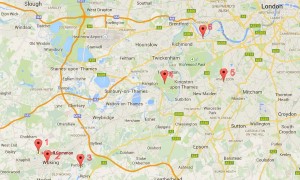 |
On the wall were several larger maps, including one locating each of the landing places of the cylinders. Holmes studied it, drawing on his pipe reflectively. "Why here?" he asked abruptly. Churchill glanced at him. "How's that?" he asked. Holmes glanced at him. "Why are they all here?" he asked. "Two hundred million miles they came, and they all landed within - what - twenty miles of each other? Why not Paris, New York, Peking?"
Cavendish laughed indulgently. "Why, because the British Empire is the most powerful nation on Earth!" he said, as one stating a self-evident fact. It was a fact that all present knew to be true. Holmes smiled thinly. "Yes," he said, "but how did they know that?" he said, enunciating each word clearly.
The others blinked at each other. It had been so obvious that England was the place to target the Martian attack that it had never occurred to anyone - in this room or elsewhere - to wonder how the Martians were able to discover that. Cavendish spluttered; "Well... telescopes, or something?" Quartermain snorted. "Damned good telescopes," he said, "to count a nation's army at that distance." It was an uncomfortable question, and one for which no-one had an answer.
Perhaps fortunately, at that moment the gong was rung for dinner, and the group moved to the Dining Room where an excellent dinner was served by the efficient staff of the Base. By common agreement, all "business" was put aside at the table, as the reassuring rituals of a gentlemanly British dinner restored a sense of order and normality to the weary men for a while. Finally, chairs were pushed back. Cavendish and Horton took their leave, retiring to their own quarters in another part of the Base, and Churchill also bade his comrades good night. His burns were hurting, and after a stop at the Infirmary to secure some of Dr Meredith's soothing salve he went to bed. Images of soldiers - his men - twisting in the flames tormented him; sleep was elusive.
Holmes and Quartermain took brandy and cigars back to the library. After a little while, Holmes checked they were not being observed and the pair turned their attention to the Occult section of books.
The grille covering them was not a real obstacle; either could have smashed it easily. However, neither felt inclined to abuse the Base's hospitality so, and they eyed the structure for other means of access. Neither knew a great deal about picking locks, but Holmes realized that the screws for the hinges could be reached from outside with a long screwdriver. Quartermain produced a hunting-knife with gadgets mounted all over it which would do so. Again, they hesitated to damage the structure, and contented themselves with reading the titles. They did not make for pleasant reading...
| Book | Author | Language |
|---|---|---|
| Grimorium Verum | Marcus Sergius | Latin |
| Fourth Book of Cornelius Agrippa | (Tr) Guillermo Bartolemo | Italian |
| Mila ya uchawi-eusi (the Rituals of Black Magic) |
Nduati | Kôric |
| Forbidden Fables of the Destruction Faiths | Theodorus Vogel | English |
Shuddering, Holmes copied the titles into his notebook. Perhaps some research elsewhere might reveal some details of the likely contents. Quartermain hefted the screwdriver and lifted his eyebrows. Holmes shook his head, pocketed his notebook, selected a more normal volume for bedtime, and bade his companion good night.
Left alone, Quartermain stared into the fire for a long time, visions of two huge, dark, pitiless eyes chasing through the flames as he finished his brandy. Finally seeking his own bed, he slept with his heavy revolver under his pillow within easy reach.
Before breakfast the next morning, Holmes strolled around the sections of the Base set aside for the Investigators, chatting to the guards and using his matchless grasp of the human psychology to get to know them. Of course, there was little common ground between the urbane Holmes and the working-class soldiers, but his perceptions attuned to their every nuance, the detective was able to deduce a fair amount. The men were all what they seemed, normal soldiers, of the type trusted to guard important things. Many seemed nervous, especially of what was beyond the areas he had acess to, down the long corridor ending in another armoured door. He was pretty sure that, had he tried to proceed, the guards there would have politely turned him back. He did not make the attempt.
Breakfast was as good as dinner, and Cavendish and Horton joined the investigators. Afterwards, over coffee, he spoke up. “Today, I intend to show you what we’re trying to achieve here. Come with me.” Leading them down to the forbidden corridor, he gestured at other areas as they passed. "Our rooms and offices are that way," he said, "and the barracks, servants, kitchens - all that stuff is that way," he finished dismissively, clearly completely disinterested in such mundanities.
Through the armoured door were stairs descending, which led to a lower floor, marked on the wall as "KL3"
The workshops comprised two sections, from both of which the sounds of mechanical work and conversation could be heard.
The first section contained several Martian Fighting Machines in various states of damage and disrepair, with scientists and engineers busily at work on them. Components and subsystems were spread across workbenches, dismantled and being carefully studied. These, then, were the people Cavendish had mentioned who knew more about the innards of Fighting Machines.
The next section looked similar, but at second glance the machines were not made of the Martian metal, but regular terrestrial steel, heavily bolted around a bulky body. The tentacles were replaced with two jointed arms, and a large boiler was mounted on the back, evidently to provide steam for the pistons that powered the legs instead of the Martians’ pseudo-muscles. Instead of the funnel-shaped projector of the Heat Ray, the thing was armed with a heavy 3” gun, with a box for shells underneath.
The engineers working here seemed to be expecting the visit, and gathered deferentially around Cavendish as they prepareed a demonstration. The chief engineer was brought and introduced as Warburton. Shaking hands all round, Warburton exuded calm compentence. "I'm sure you'll be impressed with this today, sirs," he said confidently.
One of his subordinates climbed into the hood of the machine as steam was raised. Slowly, it lurched into action, and walked back and forth across the workshop, hesitantly at first, with much grinding and groaning and jets of escaping steam, where the Martian machine was quite quiet and emitted a green vapour.
From Cavendish’s reaction, this was evidently an achievement, and he handed out praise generously as the driver halted his engine and climbed down, sweating slightly. "Of course," said Warburton, "It'll be bigger when it's ready to go into action!" The thing was only around ten feet high, but when the legs were fully extended, would be sixty feet tall; not as big as the Martian machines, but (Warburton asserted) far more stable. He offered the investigators a chance to try it out.
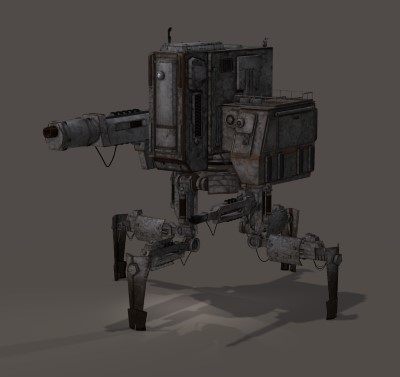 |
Churchill climbed aboard, looking around at the interior. It was designed for a human, and far more comfortable than the Martian vehicle; reassuringly Terrestrial in design, with levers and valves and gauges. It also looked as if it was designed to be air-tight. Reaching out, he pulled a lever, and was rather taken aback when the safety valve blew and all the steam was lost. "Ah," said Warburton tactfully, "we're working on a model that can raise steam more quickly." Quartermain, Smith and Private Blakeley all tried their hand and found it harder than they expected. Meanwhile, Holmes was deep in conversation with Warburton.
"How do you expect it to cope with the Heat Ray?" asked Holmes. Warburton looked uncomfortable. "There's nothing we know can resist that for long," he said, "the HFM is as armoured as we can make it. We're hoping to take the enemy out at range if we can." Holmes thought for a moment. "Heat sinks?" "Yes, we've fitted some, we'd use bigger if it could carry the weight." "Shiny surfaces?" "Maybe. Once the lads in the Labs get control of a Heat Ray we can test that," said the engineer.
Churchill asked if he could join the training program for the drivers of the Vehicle. "What's it called?" he asked. Warburton scratched his head. "We call it the Human Fighting Machine," he said. Churchill's eyebrows came down. "That's a bit like saying we're copying them," he objected. "It needs to be something inspiring, something that says we invented it. Something like - the Earth Walker."
He'd spoken loudly enough that the workers could hear him. Heads were nodding and approving glances being exchanged; Churchill's knack for turning a phrase had scored again. As the Investigators headed for the stairs down, it was clear the machine had just been renamed.
In the Workshops the atmosphere had been of rather jaunty, brisk British engineering. That of the next level down was quite different. The workers here moved with a tense, cautious manner which bordered on outright fear; voices were hushed and every action was made with painstaking care.
The labs were divided into four sections; as the visitors passed through the first doorway, Quartermain glanced up. "Walls are thicker," he noted, "and the doors seal." Holmes nodded. "Telling, isn't it? I wondered if you'd notice." Quartermain smiled behind him as he walked away, strongly suspecting that the Great Detective hadn't himself noticed before...
The first room contained what Cavendish identified as the power generators from several Martian machines spread across work-benches, with engineers and scientists tinkering with them. Churchill's eyes widened at the sight of a large scorched patch on one of the walls and across the floor and ceiling - he now understood why Cavendish had stopped him trying to play with the machines in the Cylinder. The workers gathered disconsolately around Cavendish and heads shook; there were no breakthroughs here.
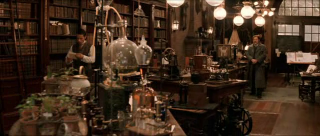 |
As they watched, it struck Holmes that many of the men looked decidely unwell; sallow-featured, slow-moving, many with coughs and several seemed to be losing their hair. As they left, he mentioned it to Cavendish, who nodded; "Yes, the work does seem to affect them somehow," he said. Holmes frowned. "Don't you know how?" he asked intently, "Do you not care for them?" Cavendish bridled. "Of course we do," he said shortly. Holmes wasn't put off. "I want to talk to Dr Meredith about this," he said. "Very well. But this is a war," said Cavendish, "sacrifices have to be made." Churchil spoke up. "You can't win a war if your men are collapsing around you," he said as they entered the next room.
This was lined with sealed glass tanks, many containing various animals. Some looked normal, some were clearly dead, and one tank of rats was thrashing and gasping in the hideous convulsions of creatures caught in the Black Smoke. “Looking for an antidote, or filter, or something,” said Cavendish. The rats subsided, twitching. “Not found one yet.” Holmes turned on one of the scientists watching the rats in disappointment. "Get a summary of your findings to me by tomorrow," he barked, and stalked out. Churchill caught up with him. "Something the matter, Holmes?" he asked quietly. Holmes snorted. "We were half an inch of glass away from death in there," he said angrily, "and this whole operation is conducted with the laxest of discipline."
He was still fuming as they walked into what looked rather like a shooting-range. Scattered around were several of the funnel-shaped generators for the Heat Ray. Several burned patches and repaired holes in the walls showed signs of catastrophic explosions, and the walls in here were reinforced over again what was usual on this level. No demonstration was offered here either.
Last came a second room lined with glass tanks, but these contained living samples of the Red Weed and Red Creeper, evidently nurtured with enormous care. Jars of formalin around the walls hold dead pieces of the red plants. “Found some seeds in the third cylinder,” says Cavendish. “Might learn something from the stuff if we can keep it alive.”
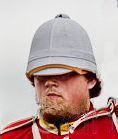 |
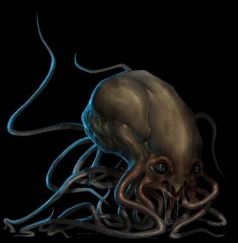 |
Before descending to the lowest level, Cavendish stopped and instructed Pte Blakeney to wait at the top of the stairs. "Need-to-know stuff, this," he said firmly. Blakeney glanced at Churchill, now technically his CO, who nodded, and the man went to stand with the four guards who greeted him with a friendly nod. More here, thought Churchill, what's going on?
At the bottom of the stairs, heavy doors led into a corridor, with four doors off it, each next to a heavy shuttered window. Cavendish stopped before one of these. “Now,” he says with glee, “our prize exhibit!” and opened the shutter so the investigatorss could look in.
The huge, cold eyes of a Martian looked dispassionately back at them!
Everyone except Cavendish started backwards in shock. Tentacles writhing, the creature's eyes ranged across the group; cold, analytical, with no trace of fear. Cavendish was looking at his fob-watch. "Good," he said, apparently oblivious to the impact the sight was having, "feeding time."
At the back of the cell, a hatch opened and a slightly bemused-looking cow was shoved hastily in, the hatch banging shut behind it. The Martian looked over at it, then back at the humans. Any expression it may have had was unreadable, but there was an indefinable suggestion that it was not pleased. "Not their favorite food," commented Cavendish.
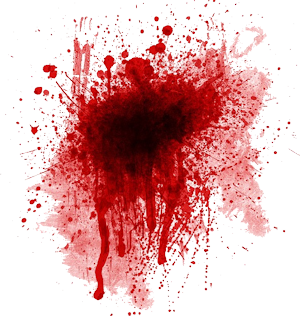 |
Churchill turned without a word and stormed off down the corridor, followed by Smith. Neither had any intention of watching this process again. The others stared in horror as the Martian suddenly lunged at the cow, tentacles enwrapping it from all sides, pinioning it helplessly in a moment. From somewhere, one tentacle produced a small metal pipette, which it drove into the hapless animal's jugular. As it did so, the hideous, eldritch hooting noise began to emanate from it, the sound Smith had reckoned was air being expelled to prepare for suction. Seconds later, the cow began to thrash helplessly and futilely as blood drained from it into the Martian. Rapidly, the convulsions became weaker, until finally it went limp. The Martian relaxed its' grip, letting the corpse sag, and glanced at the spectators once more. Then, in a single swift movement, it siezed the beast's head in four tentacles and tore it completely off. Turning, it hurled the gory mass directly at the glass and its' captors beyond. The head smacked into the thick glass in a splatter of blood and slid to the floor, leaving a bloody smear in its' wake.
"As I said," said Cavendish quietly," not its' favourite food."
Holmes turned to him. "Where did you get this?" he asked tightly. Cavendish explained that the creature was found in the Pit at Putney under a tangle of scientific equipment, apparently recovering from the crazy mixture of illnesses that slew all its’ compatriots. Apparently, the Martians had understood what was happening to them, and had created a cure … just too late.
The significance of this was not lost on Holmes and Quartermain. "If the crystals did allow them to communicate back to Mars," said Holmes slowly, "that means they know what happened to the first attack... and it means they may know what to do about it." Horton especially seemed horrified; he was leaning against the wall muttering "they're coming back! they're coming back!" under his breath, rocking slightly, before sliding to the floor.
Session Date: 5th March 2015 |